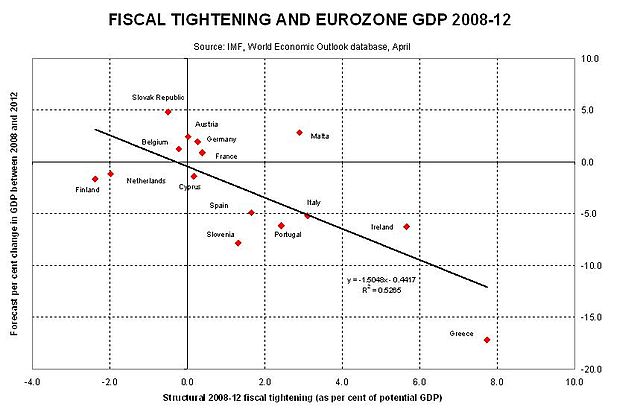In economic policy, austerity is a set of political-economic policies that aim to reduce government budget deficits through spending cuts, tax increases, or a combination of both. There are three primary types of austerity measures: higher taxes to fund spending, raising taxes while cutting spending, and lower taxes and lower government spending. Austerity measures are often used by governments that find it difficult to borrow or meet their existing obligations to pay back loans. The measures are meant to reduce the budget deficit by bringing government revenues closer to expenditures. Proponents of these measures state that this reduces the amount of borrowing required and may also demonstrate a government's fiscal discipline to creditors and credit rating agencies and make borrowing easier and cheaper as a result.
Relationship between fiscal tightening (austerity) in eurozone countries with their GDP growth rate, 2008–12
Austerity protest in Athens, 2011
The Great Recession was a period of marked general decline observed in national economies globally, i.e. a recession, that occurred in the late 2000s. The scale and timing of the recession varied from country to country. At the time, the International Monetary Fund (IMF) concluded that it was the most severe economic and financial meltdown since the Great Depression. One result was a serious disruption of normal international relations.
A bank run at a branch of the Northern Rock bank in Brighton, England, on September 14, 2007, amid speculation of problems, prior to its 2008 nationalisation
Relationship between fiscal tightening (austerity) in Eurozone countries with their GDP growth rate, 2008–2012
Sydney's financial district at night. Throughout the Great Recession, the Australian economy remained resilient and stable.
The anti-austerity movement in Spain, May 2011





